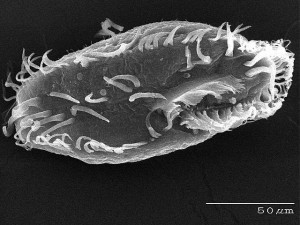
Usually I try to pick items with broader philosophical or theological implications, or something with a practical application, in the hopes that everyone can find something they can connect with. But there are days when you just need to stare directly into the mind-melting bizarreness of the world and go ‘huh.’
Meet Oxytricha trifallax. Where you and I have 23 chromosomes (in duplicate), these guys have 16,000. Then they have a second copy of their genome that’s scrambled in some way; the article describes it as encrypted but I don’t really understand what that would mean in this context. That scrambled copy is for trading, so that new gene variations can be obtained during stressful times when new solutions are needed. At a high level, it’s not too different from what any other organism does, but the details of the implementation are very far removed from anything else.
If our exploratory observations are still finding novelties like this, what other marvels await? Anyone else find this sort of thing fascinating? How do you respond to examples of life’s boundless diversity?
Andy has worn many hats in his life. He knows this is a dreadfully clichéd notion, but since it is also literally true he uses it anyway. Among his current metaphorical hats: husband of one wife, father of two teenagers, reader of science fiction and science fact, enthusiast of contemporary symphonic music, and chief science officer. Previous metaphorical hats include: comp bio postdoc, molecular biology grad student, InterVarsity chapter president (that one came with a literal hat), music store clerk, house painter, and mosquito trapper. Among his more unique literal hats: British bobby, captain’s hats (of varying levels of authenticity) of several specific vessels, a deerstalker from 221B Baker St, and a railroad engineer’s cap. His monthly Science in Review is drawn from his weekly Science Corner posts — Wednesdays, 8am (Eastern) on the Emerging Scholars Network Blog. His book Faith across the Multiverse is available from Hendrickson.

Leave a Reply